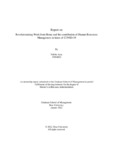| dc.contributor.advisor | Rahman, Syed Mahbubur | |
| dc.contributor.author | Azad Noor, Nabiha | |
| dc.date.accessioned | 2022-05-17T06:06:36Z | |
| dc.date.available | 2022-05-17T06:06:36Z | |
| dc.date.copyright | 2022 | |
| dc.date.issued | 2022-01 | |
| dc.identifier.other | ID 19264022 | |
| dc.identifier.uri | http://hdl.handle.net/10361/16628 | |
| dc.description | This internship report is submitted in partial fulfillment of the requirements for the degree of Masters of Business Administration, 2022. | en_US |
| dc.description | Cataloged from PDF version of internship report. | |
| dc.description | Includes bibliographical references (pages 66-72). | |
| dc.description.abstract | With 30 carefully chosen journal articles, this review article outlines how the deadly pandemic COVID-19 has aggravated organizational challenges along with health implications. With the health risks directly associated with any organization’s largest capital, human resources, the HR leaders have been put in the front-line. How each of the HR practitioners handled this crisis across countries is a testament to the coming years of organizational revolution. The findings of this report showed two major insights: the first being how some organizations, due to not having any contingency plans and resort to short-term cost cut approaches like downsizing, hiring contractual workers as well as withdrawal of financial incentives. This led to the remaining workforces resuming their jobs in fear and unmotivated, eventually resulting in the organizations’ downfall. The second one was HR practitioners opting for a relationship-oriented leadership, where employees were seen as whole individual beings rather than the organization’s resource input. Instead of downsizing, HR practitioners of the latter insights focused more on formulating policies that cut costs excluding the workforces, fostered employee retention through lesser shifts and ensured that their employees were of sound health, both mentally and physically. Employees in WFH were given autonomy and the liberty to be self-responsible, whilst onsite workers were given the utmost care and concern regarding their safety and health measures– which helped organizations recover from the pandemic and build mutual trust and openness between managers and employees. In the future, how well organizations will adapt to remote working and comprehend human capital in its truest form will prove its resiliency in terms of crisis management and sustainability in the long run. | en_US |
| dc.description.statementofresponsibility | Nabiha Azad Noor | |
| dc.format.extent | 72 pages | |
| dc.language.iso | en | en_US |
| dc.publisher | Brac University | en_US |
| dc.rights | Brac University Internship reports are protected by copyright. They may be viewed from this source for any purpose, but reproduction or distribution in any format is prohibited without written permission. | |
| dc.subject | Covid-19 | en_US |
| dc.subject | Human resource management | en_US |
| dc.subject | Work from home | en_US |
| dc.subject | Remote working | en_US |
| dc.subject.lcsh | Business logistics. | |
| dc.title | Revolutionizing work from home and the contribution of human resources management in times of COVID-19 | en_US |
| dc.type | Internship report | en_US |
| dc.contributor.department | Graduate School of Management, Brac University | |
| dc.description.degree | M. Business Administration | |

